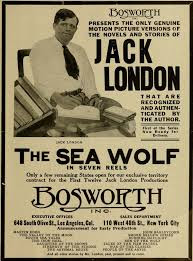1876-1916
Writer Jack London was born John Griffith Chaney in San Francisco on this date. In addition to being a prolific novelist and writer of short stories, he was also a journalist and a very vocal social activist. He got his last name that he is known by today from his step-father John London. His life and writing were greatly influenced by his "colorful" young adult life that included working in an cannery, becoming a oyster pirate, and actually "hoboing" around the country, homeless for a time. He was greatly influenced by his foster mother Virginia (Jenny) Prentiss, who was African-American and a former slave. In 1893 he began writing short stories, the first of which was entitled "Typhoon off the Coast of Japan" based on his sailing experiences. His managed to get the story published that same year; yet by 1894 he was homeless again. He was arrested for vagrancy, and spent a horrible month in jail in which he wrote that he was witness to the "awful abysses of human degradation." After this, he devoted his time to intensive self-education; spending vast amounts of time in the Oakland Public Library. He did manage to get into the University of California, Berkeley, but had to leave a year later due to financial reasons. In 1897 he joined the Klondike Gold Rush. During this time he wound up suffering from a whole host of health hardships from frostbite to scurvy; all of this left his health seriously and permanently impaired. His struggles to survive during this time inspired the story "To Build A Fire." After this, his writing took off and, he managed to become the most prolific and highest paid author of his time. He was part of the radical literary group in San Francisco known as "The Crowd." He was also very active and passionate advocate for rights of workers and unionization; and an outspoken advocate for socialism. After 1905, he became a self-educated "earth friendly" rancher. He was also an animal rights activist; focusing (far ahead of his time) on the cruelty shown to circus animals (something that is still an issue today).
 |
| London in 1914 |
The first film that was made from his work was a short made by the Kalem Company in 1907 and was based on his novel The Sea Wolf (film's title being the same of the novel). London has one acting credit to his name, which came in 1913, in which he played a sailor in a remake of The Sea Wolf. It was shot on location in his native San Francisco and was produced by Hobart Bosworth Productions. The last silent film made that was based on his work, was made in 1929; the screenplay was an adaptation of one of his short stories, Smoke Bellew and was produced by Big 4 Film (which was a company that didn't survive long in the new talking era). Films continue to be made using his material. The latest release came in July 2014, with A Thousand Death's. Into The Void, based on his novel, in post-production and is set for release next year.
London died prematurely at the age of 40 in Glen Ellen, California, in a cottage on his Beauty Ranch, in Sonoma County. In addition to the lasting ill effects of his days in the Klondike gold run on his health, he had long suffered from serious alcoholism. He had additionally picked up tropical infections from his traveling the south Pacific after he became a rich man. At the time of his death, he was suffering from Uremia brought on by kidney stones, which is incredibly painful, for which he was taking morphine. The official cause of the death was uremic poisoning brought on by renal colic (or kidney stones) and acute nephritis (or kidney failure). Rumors of suicide swirled wildly around the time of his death (and speculation remains to this day owed to his taking morphine). And, it's possible he may have actually died from an accidental overdose of morphine. His was cremated, and his ashes were interred on his ranch; which is now part of the Jack London State Park, underneath a large boulder from the property.



No comments:
Post a Comment